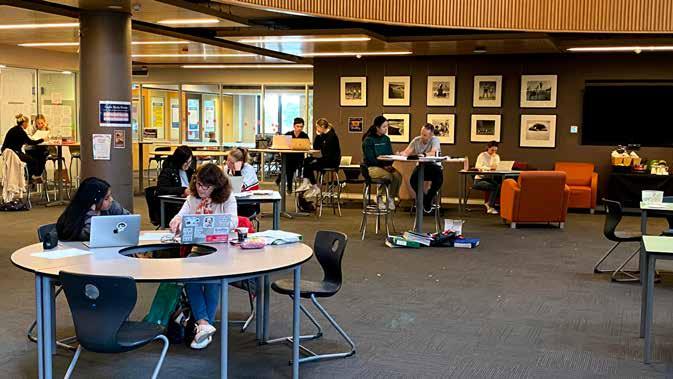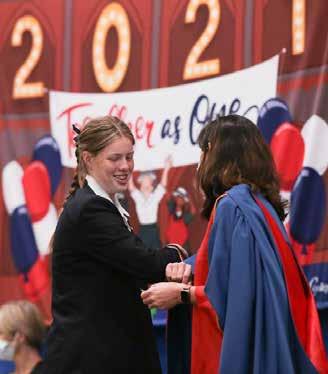
7 minute read
Student Code of Behaviour
BACKGROUND
At Pymble Ladies’ College everything we do is underpinned by the religious beliefs of the Uniting Church in Australia and the core values of our College which are:
Care, Courage, Integrity, Respect and Responsibility. Our values define our rights and the corresponding reciprocal responsibilities to ourselves and to others in the community.
All of the members of the College community have the right to: • Feel safe, physically, socially and psychologically • Learn, teach and work, free from disruption or distraction
• Be happy, respected, accepted, encouraged, supported and valued • Have their person, property and privacy cared for and protected • Be treated fairly and equitably.
Our Code of Behaviour is based on these values, the responsibilities which come from our rights, and are demonstrated in the following ways.
CARE IS DEMONSTRATED BY:
• Showing compassion and consideration for all • Treating everyone with respect, fairness and courtesy • Helping and encouraging others • Acting in a safe manner • Treating College property, your own and other people’s property with respect and care • Keeping the environment clean and tidy
COURAGE IS DEMONSTRATED BY:
• Meeting the challenges provided in and outside of the classroom to the best of your ability • Standing up for what you believe, never condoning bullying, harassment or treating others unfairly and reporting incidents which may occur • Modelling appropriate behaviour at all times and encouraging others to do so • Asking questions when you don’t understand and voicing opinions appropriately • Demonstrating initiative and leadership • Not participating in unacceptable or unsafe activities and behaviours, even if pressured to do so. Some examples of unacceptable behaviours are bullying, cyber bullying, excluding, smoking, drinking alcohol, using, possessing or supplying illegal drugs, partaking in substance abuse.
INTEGRITY IS DEMONSTRATED BY:
• Being honest and truthful • Pursuing what is right.
RESPECT IS DEMONSTRATED BY:
• Being thoughtful of and co-operating with others • Appreciating the gifts, talents and uniqueness of others
• Allowing other students to learn and teachers to teach by not disturbing nor disrupting in class or other activities
• Listening to others and responding thoughtfully • Treating people with courtesy, including standing to greet members of staff or visitors when they enter a classroom, opening doors for adults, speaking quietly on public transport • Demonstrating pride in the school by wearing the uniform correctly and being well groomed • Keeping classrooms and grounds clean, tidy and free from litter
• Moving around the College in an orderly and considerate manner
• Extending due courtesy to visitors to the College, greeting them politely and offering guidance and assistance
• Replying to invitations appropriately by the requested date and writing a letter of thanks after a function or after receiving a gift or prize • Not criticising, ridiculing, belittling, excluding, humiliating or physically harming others.
Student Code of Behaviour
RESPONSIBILITY IS DEMONSTRATED BY:
• Being punctual to classes and activities • Committing yourself fully to your academic, physical, social, emotional and spiritual development • Preparing carefully for and participating to the best of your ability in all classes and activities • Completing all tasks, homework and other work, in a punctual manner • Obeying the College rules and meeting College expectations • Following directions given by staff members, immediately and with good grace • Working co-operatively with staff and others to create a happy, safe, learning place • Owning your own behaviour and actions • Reporting to the nearest teacher any accidents, incidents or damage involving yourself or others • Behaving publicly in ways that reflect positively on yourself, your family and the College, in and out of school uniform.
IN USING TECHNOLOGY
Care is demonstrated by: • Protecting relationships by not sharing / publishing material that could be hurtful or offensive • Considering how our words and actions impact on ourselves, the College and the community • Acting in a safe manner to protect ourselves and others.
Courage is demonstrated by: • Taking action and reporting inappropriate use of technology • Using technology in a way that positively affects our learning • Using technology to promote critical thinking and problem-solving skills.
Integrity is demonstrated by: • Maintaining a positive digital footprint and online identity • Harnessing expertise and skills with technology to improve learning, rather than engaging in destructive activities.
Student Code of Behaviour
Respect is demonstrated by: • NEVER bullying, harassing, demeaning or hurting others • Treating College property, our own and other people’s, with respect and care • Acknowledging the intellectual property of others and abiding by copyright laws • Collaborating and communicating with others in a way that is respectful of the College Code of
Behaviour.
Responsibility is demonstrated by: • Recognising that the College has the authority to log, monitor and restrict services to help you become a responsible digital citizen • Protecting your digital identity by never sharing usernames and passwords.
TECHNOLOGY CODE
Technology is an integral part of the Curriculum at the College and of the everyday life or its students. Much of the information available to students in this digital age is delivered in electronic format. Students have access to equipment and systems for information communication, which are costly resources and need to be treated properly. In addition, students need to learn to use technology appropriately and safely. Policies All students are expected to read, observe and sign the Student Code of Behaviour Policy. No unauthorised material using the College’s image or name may be published on the internet without prior consent from the Head of School. This includes images, comments, information about the College, its staff, self or other students in the context of the school. Wherever a student identifies herself online as a member of the College, the same code of behaviour and responsibility should apply.
Laptop care Students are reminded never to leave their laptop unattended, to carry their laptop in its bag, in a protective case or cover, to safeguard it from liquid spills and other accidental damage. Laptops must be stored and locked in student lockers during break-times and when not in use.
Mobile phones The College promotes interaction and engagement through face-to-face and physical activities provided during recess and lunchtimes, instead of passive interaction with digital devices. Inappropriate use of mobile phones will be managed in line with the Student Code of Behaviour. If brought to school, mobile phones are the responsibility of the owner.

Student Code of Behaviour
If a teacher requests students to use their phones for a learning activity, the teacher will manage this in relation to the specific activity. If parents need to urgently contact their daughters during the day, they can send a message (email or phone) to the relevant School Office and the student will be advised.
Cameras Cameras (e.g. webcams, drones, mobile phones, still cameras, digital cameras, video cameras, iPads, etc.) must not be used to capture images/video of students, staff members, or property of the College without the explicit permission of College staff.
ANTI-BULLYING POLICY
The Pymble Ladies’ College philosophy is underpinned by the core values of Care, Courage, Integrity, Respect and Responsibility. The College is committed to take reasonable steps to provide a safe, secure and caring environment; to raise awareness and understanding of bullying, violence and harassment; and provide support and counselling services for those involved in bullying behaviours. Bullying is a repeated form of harassment, physical or psychological, which is a deliberate attempt to cause discomfort, embarrassment or pain. It is unwanted, unwelcome, unsolicited and persistent and can be an inappropriate use of power, position and/or privilege by an individual or group. It is done to intimidate, coerce, engender fear, or control and aims to upset or create a risk to another person’s health and safety, their property or their social acceptance.
Bullying is different to mutual conflict, for example where there is an argument or disagreement between persons who don’t have an imbalance of power. It is not social rejection or dislike such as refusing to play with a particular child or not inviting them to a party. It is not single acts of nastiness or meanness, random acts of aggression or intimidation.
Restorative justice helps students learn from their mistakes, reconcile, and resolve problems with others. It encourages individuals to: • Look at the impact of their behaviour on others • Recognise that their behaviour can cause harm, hurt or damage to relationships • Take responsibility for their actions • Accept and acknowledge that they have violated the accepted norms • Develop empathy and concern for others • Work with the person/s affected by their actions to repair the damage they have caused • Change their behaviour and move forward positively.
Allegations of bullying can be made by the student or parent/carer to the teacher, Compass Teacher, Head of Year, Deputy Head or Head of School. Allegations will be investigated using the principles of natural justice. Students found to have committed bullying will be involved in a restorative justice process and may be subject to disciplinary procedures which will vary according to the seriousness of the behaviour. Consequences for proven allegations may vary according to the student’s behaviour, prior record, age and maturity, and may range from admonition to suspension or termination of enrolment.










